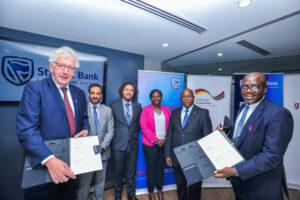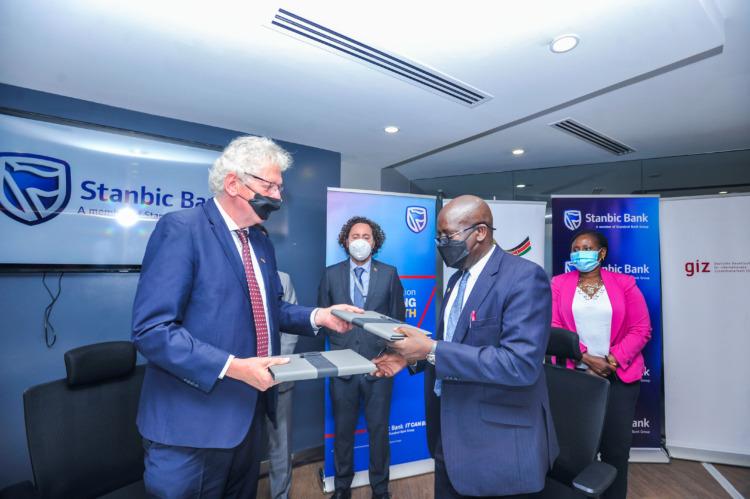- Stanbic Bank, Stanbic Kenya Foundation and the German Development Cooperation have signed a deal to help MSMEs
- The partners say the Ksh 62million project seeks to support Micro Small and Medium Enterprises (MSMEs) to respond, restore and rebound from the effects of the pandemic
Kenya’s Stanbic Bank, Stanbic Kenya Foundation and the German Development Cooperation have entered into a partnership aimed at accelerating business recovery and growth of small enterprises post the Coronavirus Disease (COVID-19) Pandemic.
In a statement, the partners say the Ksh 62million project seeks to support Micro Small and Medium Enterprises (MSMEs) to respond, restore and rebound from the effects of the pandemic.
The partnership is under the Employment and Skills for Development in Africa (E4D) Programme commissioned by the German Federal Ministry for Economic Cooperation and Development (BMZ) and implemented by GIZ and Stanbic Kenya Foundation.
The business recovery interventions under the partnership will be provided to 500 micro-enterprises and 200 small enterprises drawn from services, trade, agriculture, manufacturing and construction centres.
The intervention which targets 3,000 beneficiaries drawn from the sector seeks to entrench the entrepreneurial culture in MSMEs, build their businesses and technical skills to enhance their capacity, expand market opportunities as well as gain access to affordable financing.
To seal the agreement, a Cooperation Agreement was signed in Nairobi in an event that was officiated by Chief Administration Secretary, Ministry of Industrialization, Trade and Enterprise Development, Lawrence Karanja.
Other dignitaries present were Stanbic Bank Kenya Chief Executive, Charles Mudiwa, GIZ Country Director, Bodo Immink and Stanbic Bank Head of Foundation, Pauline Mbayah.
In his address, the CAS lauded the collaboration between Stanbic and GIZ saying it will assist MSMEs to bounce back from the effects of the pandemic.
“MSMEs make a substantial contribution to livelihoods and inclusive growth in the country. Given that they account for a considerable percentage of the country’s Gross Domestic Product (GDP), this partnership will have a great impact on our small businesses and the economy,” he stated.

While giving his remarks, Mudiwa said the programme will provide business recovery tools with a focus on three main areas; provision of entrepreneurship and business skills introducing new business models as a consequence of COVID-19 such as digital marketing and online sales, access to credit to help MSMEs struggling to find funding to run their businesses and facilitating access to new markets and value chains.
“Part of the business recovery tools to be provided by the programme will be the facilitation of 0% interest loans for MSMEs that can present sustainable business plans,” Mudiwa added.
In his remarks, Immink underscored the German Development Cooperation’s commitment to partnerships to promote the creation of decent and sustainable jobs.
“Micro and small enterprises are key to employment creation, but have been facing unprecedented income losses and uncertainties about their future because of business disruptions due to the outbreak of COVID-19.. This partnership therefore seeks to ease some of the challenges SMEs face to ensure that they consolidate their business and continue to grow, thus creating job opportunities for Kenyan youth”, said Immink.
Kenya: Women own half the 1.3 million MSMEs
On her part, Mbayah said the Foundation is keen on promoting resilience and growth for the MSMEs. “From the Foundation’s perspective, resilience is looked at from three fronts; how the MSMEs are responding to the effects of the pandemic, how they restore their operations and their rebounding strategies.”
The agreement is part of a project by the German Development Cooperation to increase employability, income generation and enhance businesses.
In a separate story, The Exchange Africa reported that small and medium-sized enterprises in Kenya and the United States were key beneficiaries of the signing of a trade initiative, between the Kenya Private Sector Alliance (KEPSA) and the Corporate Council on Africa (CCA).
On October 22, the Alliance said the agreement comes on the premise of a longstanding relationship between KEPSA and CCA focused on increasing Kenya-U.S. trade and investment.
“The two organizations have over the years collaborated to organize a range of meetings and events pulling in their respective members based on an initial MoU signed in 2012 and renewed in 2020,” the organization said.
It will also help in supporting women and youth to run Kenyan entrepreneurs as well as U.S. women, minority, and diaspora owned businesses, and help SMEs in both countries address the current challenges many faces to access the two markets.
The agreement was signed by CCA President & CEO Florizelle Liser and KEPSA CEO Carole Kariuki and witnessed by President Uhuru Kenyatta in New York, U.S.A.
SMEs in East Africa to benefit from KAM, GIZ partnership











